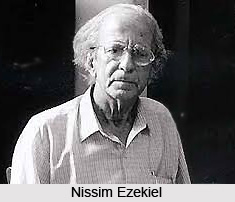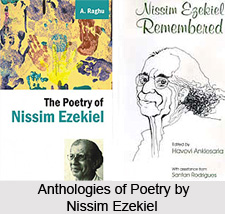 Nissim Ezekiel published his book The Unfinished Man in 1960. After working as an advertising copywriter and general manager of a picture frame company (1954-59), he co-founded the literary monthly Imprint, in 1961. He became art critic of The Times of India (1964-66) and edited Poetry India (1966-67). From 1961 to 1972, he headed the English department of Mithibai College, Mumbai. On the invitation of the US government, he went on a month long tour to the US in November 1974.
Nissim Ezekiel published his book The Unfinished Man in 1960. After working as an advertising copywriter and general manager of a picture frame company (1954-59), he co-founded the literary monthly Imprint, in 1961. He became art critic of The Times of India (1964-66) and edited Poetry India (1966-67). From 1961 to 1972, he headed the English department of Mithibai College, Mumbai. On the invitation of the US government, he went on a month long tour to the US in November 1974.
In 1976, he translated poetry from Marathi, and co-edited a fiction and poetry anthology. His poem "The Night Of The Scorpion" is used as study material in Indian and British schools. After a prolonged battle with Alzheimer`s disease, Nissim Ezekiel died in Mumbai, January 9 2004 at age 79. "The Exact Name", his fifth book of poetry was published in 1965. During this period he had short tenures as visiting professor at University of Leeds (1964) and University of Chicago (1967).
In 1967 while in America, he experimented with hallucinogenic drugs, probably as a means to expand his writing skills. He finally stopped using them in 1972. In 1969, Writers Workshop, Calcutta published his "The Three Plays".
 A year later, he presented an art series of ten programs for Mumbai television. Ezekiel received the Sahitya Akademi cultural award in 1983 and the Padma Shri in 1988. He was professor of English and reader in American literature at University of Mumbai during the 1990s, and secretary of the Indian branch of the international writers` organization PEN.
A year later, he presented an art series of ten programs for Mumbai television. Ezekiel received the Sahitya Akademi cultural award in 1983 and the Padma Shri in 1988. He was professor of English and reader in American literature at University of Mumbai during the 1990s, and secretary of the Indian branch of the international writers` organization PEN.
When he began his writing career in the late 1940s, his use of formal and correct English was criticized, given its association with colonialism. After 1965, he began experimenting with exaggerated `Indian English`. Ezekiel, being a member of the Indian Jewish community, approached poetry as an outsider and was different from the nationalistic Indian literature of that time.
Most of his poetry was that of the urban India, issues of alienation, love, marriage and sexuality. He acted as a mentor to younger poets, such as Dom Moraes, Adil Jussawalla and Gieve Patel. In the last few years of his life, he was deeply involved in helping Mumbai poets, his advice being forthright, but seldom blunt.













